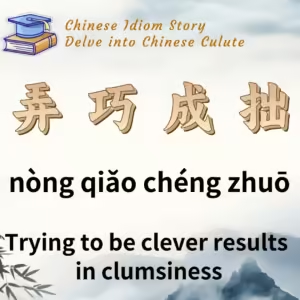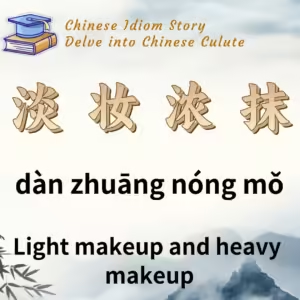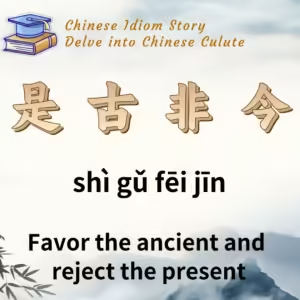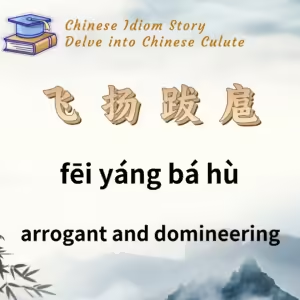
Chinese Idiom: 痛饮黄龙 (Tong Yin Huang Long)
English Translation: Heartily Drinking from the Yellow Dragon
pīn yīn: tòng yǐn huáng lóng
Idiom Meaning: It describes the heroic spirit of triumph over enemies. It is also expressed as “直捣黄龙” (Zhí dǎo huáng lóng), which means directly attacking the enemy’s stronghold. The “Yellow Dragon” refers to the capital of the Jin dynasty, located in present-day Nong’an County, Jilin Province, symbolizing the enemy’s base.
Historical Source: History of Song (Song Shi), specifically the biography of Yue Fei.
Idiom Story:
In September 1140, the Jin dynasty broke the peace treaty it had signed with the Southern Song dynasty and launched a large-scale invasion, deploying elite troops under the command of Wuzhu (兀术). The Southern Song dynasty faced the imminent threat of annihilation, prompting Emperor Gaozong to issue orders for all Song forces to resist.
General Yue Fei, upon receiving this command, quickly mobilized his troops to engage in battle. In just a few days, various factions reported victories, reclaiming territories such as Yingchang (present-day eastern Xuchang, Henan), Chen Zhou (present-day Huaiyang District, Zhoukou, Henan), and Zhengzhou. Hearing of Yue Fei’s advance, Wuzhu became alarmed and gathered his commanders to discuss strategies. Many feared that while other Song generals might be manageable, Yue’s forces would be difficult to withstand. Nevertheless, they decided to focus all their efforts and confront Yue Fei’s army head-on.
Wuzhu marched his army to Yancheng, where both the Song and Jin forces set up their battlegrounds. Yue Fei sent his son, Yue Yun, leading an elite cavalry unit as the vanguard, instructing him, “In this battle, we must win; if you don’t succeed, I will behead you upon your return!”
Yue Yun accepted the order and bravely led the charge, inspiring the Song soldiers to fight fiercely, causing the Jin troops to suffer heavy casualties. After a while, Wuzhu deployed his elite “Iron Cavalry”—a unit specially trained and clad in heavy armor, structured in threes to attack, with two additional cavalry units flanking them, known as “twisted horses.”
Yue Fei discerned the weakness of this formation and instructed his soldiers to arm themselves with axes and blades. When the enemy charged, they targeted the horses’ legs. Once the horses fell, the Jin soldiers were thrown off, allowing Yue Fei’s forces to defeat the “Iron Cavalry” and “twisted horses” decisively. Upon hearing the news of his army’s losses, Wuzhu lamented, “Since I took up arms, I’ve relied on the ‘twisted horses’ for victories; now it is all over.” Yet, he refused to admit defeat and soon launched another offensive with 120,000 troops.
General Yang Zai Xing, one of Yue Fei’s commanders, led 300 cavalry scouts and engaged the Jin forces, inflicting heavy casualties on them. Wuzhu, after failing at Yancheng, shifted his assault to Yingchang. Anticipating this move, Yue Fei dispatched Yue Yun to aid Yingchang. Leading 800 cavalry, Yue Yun stormed into battle, leaving the Jin forces unable to resist. Eventually, Song infantry and allied forces surrounded the Jin troops, resulting in another significant defeat for Wuzhu.
Yue Fei’s army continued their victorious march until they reached Zhu Xian Town, just 45 miles from the Jin capital. Hearing of Yue Fei’s progress, local militia from Hebei rallied and crossed the Yellow River to join forces with him. The common people brought ox carts filled with food to support the troops, while some offered incense as a gesture of welcome, all moved to tears with excitement.
Seeing the momentum of victory, Yue Fei could hardly contain his elation. He rallied his troops, declaring, “Let’s all strive to defeat the enemy. Once we directly strike the Yellow Dragon’s den, we will heartily drink and celebrate our triumph!”
From then on, “直捣黄龙” and “痛饮黄龙” became immortal phrases of valor, with “Yellow Dragon” symbolizing the enemy’s stronghold.






